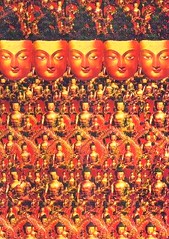At dinner after the class tonight, we talked about how people train differently to achieve the state of meditation... Actually, EZ and Jaka talked mostly and the rest of us listened.
EZ mentioned that he trained Karate for quite a while. His training was tied to Zen Buddhism similar to our training with Chan Buddhism. The ideas are the same - to achieve the state of meditation through actions or movements. But the expressions are different. While our training encourages us to express ourselves, his past training discouraged individualism. Movements were done uniformly and quietly.
Jaka pointed out that it might be Japanese influence rather than Zen as he is very familiar with Zen Buddhism which also has its own kind of action meditation - seated meditation where people actively sit, while being aware and in control of their bodies.
Regardless of the type of training we choose, the point is to be present, mindful and aware of our actions, bodies and the surroundings.
In the Buddhism class last weekend, somebody said that Chan is everything. Everything you do can be a meditation. It's kind of difficult to be in the moment and enjoy it at all time.
I guess this is why I need and enjoy training. It forces me to be present for at least two hours a day.
EZ mentioned that he trained Karate for quite a while. His training was tied to Zen Buddhism similar to our training with Chan Buddhism. The ideas are the same - to achieve the state of meditation through actions or movements. But the expressions are different. While our training encourages us to express ourselves, his past training discouraged individualism. Movements were done uniformly and quietly.
Jaka pointed out that it might be Japanese influence rather than Zen as he is very familiar with Zen Buddhism which also has its own kind of action meditation - seated meditation where people actively sit, while being aware and in control of their bodies.
Regardless of the type of training we choose, the point is to be present, mindful and aware of our actions, bodies and the surroundings.
In the Buddhism class last weekend, somebody said that Chan is everything. Everything you do can be a meditation. It's kind of difficult to be in the moment and enjoy it at all time.
I guess this is why I need and enjoy training. It forces me to be present for at least two hours a day.



Amituofo,
ReplyDeleteThat uniformity in Japanese and Korean martial arts is due largely to how martial arts were brought to Japan and Korea; through the millitary. While in China, Kung Fu was passed through families (both blood and figurative), Kung Fu came to these countries as a result of the armies and navies being exposed to them. Through them, the art was furthered and so a standard of uniformity and synchonization was set. That is why Chan Quan isn't, in my view, a "martial art." Although it is useful for self defense and protection, Chan Quan or other styles of Chinese Kung Fu are not military arts and do not build students into a martial group.
Zen, therefore, was influenced by not only the Japanese culture and way of life, but by who it was taught to it's students and how the students recieved it.
Just throwing that out there.
Amituofo,
Shi Heng Zhan